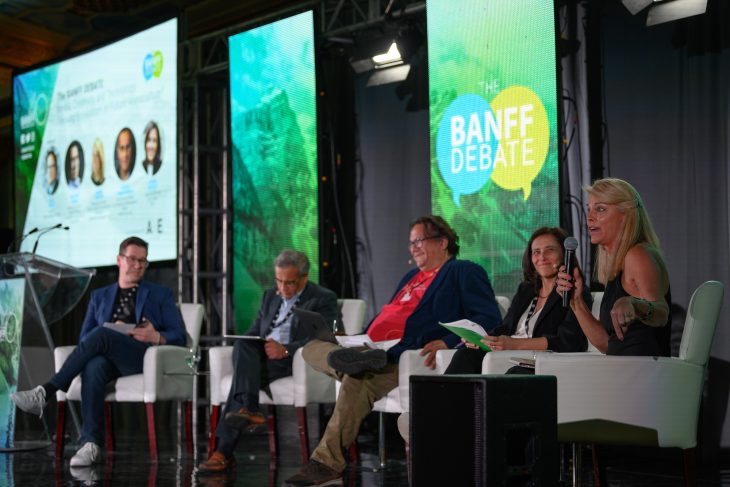
BANFF – New to the Banff World Media Fest this year was The Banff Debate.
The inaugural topic was “Media, Creativity & Technology: Thriving Ecosystem or Future Monoculture?” and framing that debate was moderator Jesse Wente, who is director of Canada’s Indigenous Screen Office.
Wente noted the conundrum of international and local players all competing for global audiences and asked:
- What does this all mean for creator opportunities and consumer choice?
- Will domestic screen cultures get hammered?
- Are local-only platforms and business models even viable in a globalize industry?
- Or are we all Chicken Littles here, where instead of a plummeting sky, the digital future truly holds unprecedented opportunity to reach new audiences in a plethora of creative ways?
To make this a tad fun, the hundreds of delegates attending were each given red/green voting cards and the four panelists were divided into two equal teams… the “bricks falling from the sky” skeptics (red) and the “oh happy days” optimists (green).
Representing the somewhat gloomy were Laura Martin, managing director and senior analyst, entertainment and internet at investment bank Needham & Company; and Joana Vicente, executive director and co-head of the Toronto International Film Festival.
On the green-is-good team were Rishad Tobaccowala, chief growth officer at advertising and PR company Publicis Groupe; and Richard Kanee, director of digital transformation at the CBC.
The Greens got off to a good start with Kanee arguing that there are 3.3 billion potential new creators “out there” with 40% of our planet now on smartphones. Tobaccowala enjoined that “there are more ways to get inspired than ever today… in fact there’s $1 trillion in parked private equity just waiting to do something… looking for a place to go.”
Citing an example from his own daughter’s digital production and sharing economy experience, he then added “…in the past what cost you $1.5 million in production now costs only $15,000.”
The Reds, under Vincente, countered that there is “more concentration coming from more companies with $150 billion net caps,” with Martin adding that we now live in a world where “it costs $200 million to produce the product and another $200 million to market and distribute it.”
Doubling down, the Reds asserted big companies have large libraries to draw on for both content and cash flow streams… plus access to sophisticated big data which small or new entrants don’t. Apple, for example can throw in three months of free subscription to their SVOD if you purchase a $1000 iPhone.
Next came a tripling down from the relentless Reds, arguing in 2019 Facebook says it will spend $10 billion on privacy compliance… an added cost that structurally advantages big versus small players. Moreover, in the hunt for talent, big market cap companies have the means to hire fresh out of grad school brainiacs for starting pay cheques of $200,000-plus. Not so, for the smaller fries.
At this point the Greens stiffened their spine.
“Stop thinking of the world in U.S.-centric terms… it’s only 350 million in a population of 7 billion.” – Rishad Tobaccowala, Publicis
Hold on pleaded Kanee. Sure, Cancon has to resonate with international audiences, but we can also succeed with local stories for local audiences thanks to digital, he said.
At which point he tag-teamed with Tobaccowala who argued that we have “more consumer choice and competition… stop thinking of the world in U.S.-centric terms… it’s only 350 million in a population of 7 billion… and increased competition is seeing more of the money going to the creators… (plus) Facebook job offer success has fallen from 90% to 49% today and Google’s public satisfaction index has tumbled from 90% to barely 70%… big is losing ground.”
This brought on the equivalent of where-have-you-been eye rolling from the Reds.
Vicente struck first with a gulping reminder “content is going to be created and produced by analytics, data points, and AI.”
Martin then showed her knuckles adding, “Sony and Universal still control 90% of the music industry, Amazon already virtually owns ESports and the 200 million people under 25 years of age who play it for hours each day,” plus big companies have the resources to highly personalize all content.
With a Monty Python toss of their heads, the Greens declared this to be merely debating flesh wounds.
Countered Tobaccowala (who mentioned his new book several times), “Facebook only sells 30% of its ads to Fortune 500 companies… the other 70% is the long-tail of smaller companies… a big platform does not mean big control.”
Then, in an 11th hour bid to sway the mushy-middle voters, Kanee pitched to a bridging position: “Independence isn’t the same thing as diversity,” he said, noting working with big players can still deliver the full menu of cultural offerings.
With this, moderator Wente called for the deciding vote.
And in a decision which was surely statistically accurate 19 times out of 20, give or take 100 votes, it was declared “a typically Canadian tie.”
Cambridge Analytica couldn’t have done a better job.
Photo of (from left): Kanee, Tobaccowala, Wente, Vincente and Martin, by Kristian Bogner.


